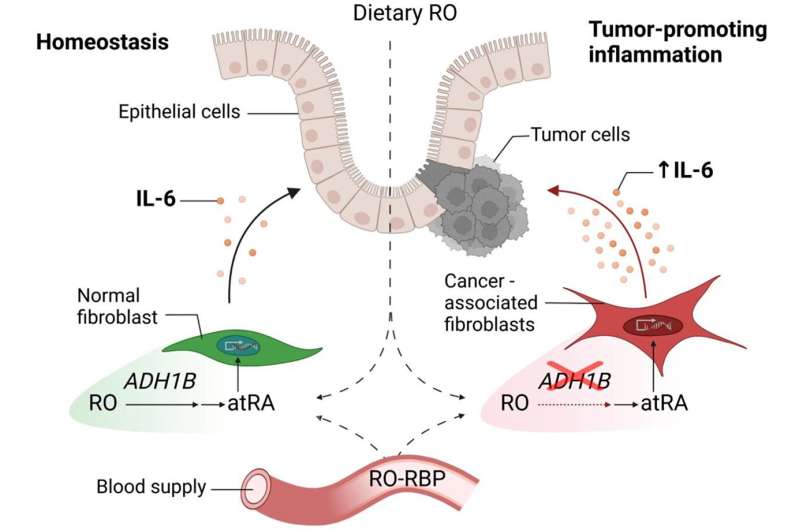This article has been reviewed according to Science X's editorial process and policies. Editors have highlighted the following attributes while ensuring the content's credibility:
fact-checked
peer-reviewed publication
proofread
Retinol disruption and the role of vitamin A metabolism in colon cancer

A new research perspective was published in Oncotarget, titled "Disruption of retinol-mediated IL-6 expression in colon cancer-associated fibroblasts: new perspectives on the role of vitamin A metabolism."
Colon cancer (CRC) is one of the most common malignancies and is a leading cause of cancer-related deaths worldwide. While the tumor microenvironment (TME) supports tumor growth and immune escape through tumor-promoting inflammation, the mechanisms by which the TME promotes CRC are far from being elucidated. Stromal myo-/fibroblasts (MFs) account for up to 30% of lamina propria cells in the normal human colon and their number is dramatically increased in CRC.
Fibroblasts from cancers, also known as cancer-associated fibroblasts (CAFs), differ from normal colonic MF (N-MFs) and support tumor-promoting inflammation, in part due to increased IL-6 secretion. CAFs are very abundant in the TME and are among the major cells involved in tumor inflammation and progression.
In this research perspective, researchers Romain Villéger, Marina Chulkina, Randy C. Mifflin, Don W. Powell, and Irina V. Pinchuk from the Université de Poitiers, Penn State Health Milton S. Hershey Medical Center and The University of Texas Medical Branch highlight recent data obtained regarding IL-6 regulation in colorectal cancer CAFs through vitamin A (retinol) metabolism, discuss current limitations in our understanding of the mechanisms leading to the CAF pro-inflammatory phenotype, and discuss potential approaches to target CAF retinoid metabolism during CRC treatment.
"While the overall mechanisms responsible for the IL-6 increase within the CRC tumor stroma remain to be elucidated, our study highlights the crucial role of stromal vitamin A pathway in IL-6 regulation," write the authors.
More information: Romain Villéger et al, Disruption of retinol-mediated IL-6 expression in colon cancer-associated fibroblasts: new perspectives on the role of vitamin A metabolism, Oncotarget (2023). DOI: 10.18632/oncotarget.28399


















